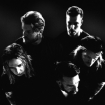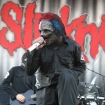As of yesterday (July 14th), the state of Florida is tracking roughly 292,000 active cases of COVID-19. According to CNN, that places the state among the top 10 most infected regions in the entire world — an infection rate that's 12x the number of cases in Australia and South Korea combined. Even so, Underoath are getting ready to play a few gigs within its borders.
Well, kind of. On Friday, July 17th, the metalcore veterans will kick off a three-part livestream concert series called "Underoath: Observatory" during which they'll play one classic album in full per show. Live, together in one room, at an undisclosed location in their home state. (You can purchase tickets to individual performances or the whole series now.) Although five of their six members are still scattered throughout Florida, the Grammy-nominated band haven't seen each other in person since January, so the idea of getting together and playing again is incredibly exciting.
They're also acutely aware that it's an enormous risk: sweating and singing in close quarters with nearly 10 other crew members in what's quickly becoming one of the pandemic's global epicenters. The situation is so fraught that both their long-time production designer and their guitar tech don't even feel comfortable showing up.
"Florida's ridiculous, man," says Underoath frontman Spencer Chamberlain. He and vocalist-drummer Aaron Gillespie, who's based in Salt Lake City, Utah, are speaking with Revolver via Zoom just a week before their first livestream show. "Just being here, it's hard to not get angry. Some places are shut down and the business right next door is a bar with people pouring out of it. And I drove by last night and there's this dude playing acoustic guitar on a little stage and there's people, and I'm like, 'What?'"
Due to the sheer precariousness of leaving one's house in Florida right now, the livestream series has been a convoluted endeavor to execute safely. Each member of the band has been taking frequent COVID-19 tests to ensure they're still negative: A single positive test will set back the entire event for two weeks, or however long it takes for them to recover.
Safety has been especially important for Gillespie, who not only has to board a flight, but also take extra precautions to protect the child his wife just gave birth to three weeks earlier. Even though they're only performing on Fridays, Gillespie is going to stay in Florida for the entire three-week period, and when he returns home, his family will be temporarily bunking with his in-laws until he can get a negative COVID test back.
For better or worse, this is the only way Underoath would even consider doing it in the first place. Although they've been carrying out a Twitch stream series throughout lockdown where they've listened back to and discussed their whole catalog, the band was adamantly against any sort of quarantine-assembled livestream set.
"The thing is, playing in different houses over Zoom or any sort of livestream thing is not real," Chamberlain says. "You cannot play together over the internet at the same time. You're pre-recorded, it's mixed down and mixed together — it's fake. And that's fine that people are doing that, but Underoath just weren't comfortable doing that."
Underoath: Observatory will be the real deal. The band will be playing 2008's Lost in the Sound of Separation, 2006's Define the Great Line and 2004's They're Only Chasing Safety in their entirety in front of five cameras, broadcasting live to fans throughout the world. Because of the pandemic, they haven't even been able to see the venue yet or meet the crew they'll be working with. Gillespie will arrive three days before their first night and they'll spend that time rehearsing and getting everything together. Even though they've never played some of the songs on Lost in the Sound of Separation live before, the safety concerns far outweigh the musical challenges of fine-tuning the set. Even do, for Underoath, all of it is worth it in the name of keeping their audience engaged.
"We do have to find ways to connect to the fans," Chamberlain says. "As concertgoers and music players, I grew up going to shows. That's what we did — we played shows and we'd go to shows when we're not playing shows. I can't imagine being a kid growing up right now and not being able to go to a show, so everything helps."
We spoke with Chamberlain and Gillespie about the logistics of Underoath: Observatory, building up immune systems over years on the road, reflecting on these older albums, and more.
WHEN DID THE IDEA FOR THIS LIVE SERIES FIRST COME TOGETHER?
AARON GILLESPIE We've been talking about it for a while. People are doing it. Lots of artists are doing it. What our whole thing was, we wanted to do it all the way. Not just rent a venue and play acoustic guitars — we wanted to put on a show. So it's a full production.
SPENCER CHAMBERLAIN What we had to do was get to a spot to where it was clear enough to fly Aaron here, and we all passed COVID tests already, and we'll keep testing throughout the process. That might change, something might get postponed, but as of now we're in the clear. And we wanted to do it to where we could play with production. It would be everything that would be a show without the crowd.
YOU MENTIONED TAKING COVID-19 TESTS. HOW MUCH HAVE YOU THOUGHT ABOUT THE RISKS OF THIS WHOLE VENTURE?
CHAMBERLAIN I think that's the scariest part of the whole thing. Is the crew and the camera crew taking it seriously enough to get tested? Because we are in Florida, and Florida is not taking this very seriously. It's really sad, and I don't know about the crew or the camera crew. I know the band will take it seriously and get tested, but how can you control a camera guy you don't know. Like, "Well, you can't go to the bar down the road that they fucking opened for some weird reason," but he's technically allowed to go there. But now we have a whole other problem on our hands.
GILLESPIE That's the weirdest part about this whole thing and doing it the way we are by getting together. It's like, you gotta fly, you gotta take the risk.
CHAMBERLAIN We might have antibodies. I want to get the antibody test. Because we grew up on the road in the shittiest, nastiest venues. Eating on the stage or on the floor, the green room with drunk people in there throwing up and shit. Like, we've been in the grossest places in the world. There's a possibility we have the antibody.
GILLESPIE I remember the first Warped Tour we did, you and I didn't shower for 31 days.
CHAMBERLAIN We would go outside and pour bottles of water on us, but we didn't really shower.
WHAT HAS REHEARSAL FOR THIS LOOKED LIKE? HAVE YOU JUST BEEN RUNNING THROUGH THE SONGS ON YOUR OWN?
GILLESPIE Yeah, everyone's on their own and then we get together. For Lost in the Sound of Separation, because there's a lot of those songs we actually haven't ever played, we're getting together for a few days before that. But for Chasing Safety and Define the Great Line, we've played those songs so many times that we'll just take a day or two and run through them together. Lost is a bit more of a learning curve.
CHAMBERLAIN None of us have seen each other since January — we're all in our homes. Most of us have studios or some kind of recording setup so everyone's just jamming to the mp3s.
GILLESPIE For the past few years we've been playing for hours a night unless we've been supporting, so this is just 44 minutes. So having three days to do that is totally [reasonable].
SO YOU HAVEN'T SEEN EACH OTHER IN SIX MONTHS AND YOU'RE PLAYING THREE ALBUMS BACK TO BACK, BUT THE MOST STRESSFUL PART OF THIS IS NOT MUSIC-RELATED AT ALL: IT'S THE HEALTH ASPECT.
GILLESPIE We've been playing together our whole lives — I don't give a shit about that, that's easy. It's all the bullshit around it. It sucks.
CHAMBERLAIN The only thing that's stressful about it is not even [the] playing. I would say that more than 50 percent of what goes into an Underoath live show is the audience, and I think their energy and their reaction and the way they sing along — or don't — changes us. Every night. Like, if last night was better, we noticed. If tonight seems like the best show on the tour, we noticed.
And every night's great, because live music, there's something about being in a room with people. We'll never recreate that. What we're trying to do is something similar for us and for the fans, but I think the only thing that's stressing me out is: We've never played a show without an audience.
GILLESPIE How do you make it feel like not a rehearsal?
CHAMBERLAIN And not fake. Underoath is so anti-faking anything — we can't just pretend. That makes it feel like a music video, and we've always said the worst thing about being in a band is the music videos because you have to be fake playing. I think the excitement of us being in a room together, not being alone, actually playing is going to be exciting.
And then you have to use something that I don't think we've ever used. Normally, we go onstage and everything's free. You're just being yourself and the crowd is there and it's awesome — those are all natural free feelings. And with this, it's like, you have to continuously remind yourself just 'cause you can't see them, doesn't mean that there aren't thousands and thousands of people watching. They're watching, right now live, but you can't feel it.
I LIKE HOW YOU GUYS CALLED THE EVENT UNDEROATH: OBSERVATORY. IS THAT BECAUSE YOU GUYS ARE IN THIS TERRARIUM-LIKE EXPERIENCE WHERE PEOPLE ARE WATCHING IN AT YOU?
GILLESPIE It's like this stamp in time. Like, the vinyl you can get if you go on the Observatory website, they have an OBI strip over them that doesn't say quarantine edition, but it's the Observatory Edition. If you collect records, a big thing is imports. You want to get the Japanese copy or the British copy or whatever, so that's kind of the idea behind this. This snapshot from a time that sucks — let's make it cool.
SO WHY DID YOU WANT TO DO THESE THREE RECORDS IN PARTICULAR FOR THIS SERIES?
CHAMBERLAIN I think we thought about ... Chasing Safety and Define ... because there wouldn't be a lot of rehearsal, because we've already done the Rebirth Tour. But we really wanted to do Lost ... because we've never done it. In my brain, we would play Disambiguation and Erase Me, as well, but we've never done this so we're just starting with what we know and we added the one because we were just like, "We have to play that record front to back because we never have," and we didn't want to just do what we did on Rebirth.
We have no idea how this is going to go. We don't know if we'll be able to get through it with health and COVID. We don't know if, by the time we're done with it, COVID is in the clear and bands are going back on tour. We have no idea what's gonna happen. Every day we wake up and it's something different. We felt like this is a good place to start. If this keeps on going then hopefully we can keep doing these different shows.
WHAT'S IT BEEN LIKE TO REVISIT LOST IN THE SOUND OF SEPARATION AND SOME OF THOSE SONGS YOU HAVEN'T PLAYED IN YEARS?
GILLESPIE It's funny to go back and listen to that stuff. I've never been one of those artists that listens to his own music over and over again. I will for a little while to learn it, but especially if it's something that came out 10 years ago, that's not even on my radar. It's a cool record. We just did this Twitch series where we broke down and listened to all the records. And that, in my opinion, is the most unique Underoath record. The way it ends, and the songs are so strange, the arrangements are so strange and its lyrically strange. So I'm really excited about it.
CHAMBERLAIN I feel like we've constantly gotten better. If you don't, you're doing something wrong. We're getting better as individuals, singers, lyric writers, music writers, as players, on every record. So when I look back on the first era of Underoath, I feel like Lost encapsulates everything that we wanted to do. I feel like that's a great representation of what the band was. I look back as, like, if I were to picture the first decade of Underoath, that would be the album. Even though to [many] people, it's Define the Great Line because that's the first real shift.
I think Chasing Safety was a bunch of kids who had no idea what they were doing and didn't know what they wanted and an older dude who was the producer telling them what to do and how they're gonna do it. And Define was us being like, "Well, wait a minute. We're actually like this, and we know who we are a little bit and we're going to discover ourselves, and this is how we're going to do things and you're not going to understand till it's done." And then Lost is: "We're making a point — this is exactly who we fucking are, like it or not."








